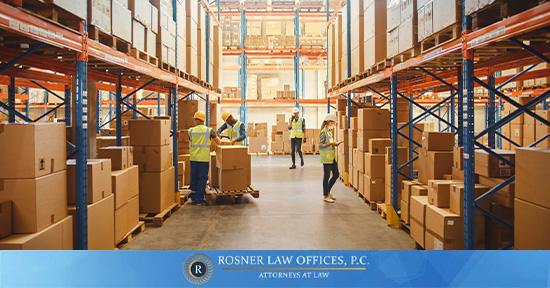Workplaces are meant to be safe environments where employees can perform their duties without fear of harm. However, accidents and injuries still occur far too often, and sadly, many of these incidents are preventable. A significant factor contributing to workplace accidents is employer negligence.
For workers who have been injured on the job, it’s crucial to understand the role that employer negligence can play in causing unsafe working conditions, as well as your rights as an employee.
What Does Employer Negligence Mean?
Employer negligence refers to a scenario where an employer fails to provide a reasonably safe work environment for their employees. This failure can manifest in various ways, such as ignoring safety protocols, neglecting to maintain equipment, or failing to address known hazards.
Employers have a legal obligation to prioritize the health and safety of their employees. This duty, often called a "duty of care," requires that they adhere to workplace laws and regulations, stay proactive about safety, and address potential risks as soon as they're identified. Negligence on their part can lead to unsafe conditions that compromise employee safety.
Common Examples of Employer Negligence
If you have been injured at work, you might be wondering if your employer’s actions—or lack thereof—had a role in the incident. Here are some common ways employer negligence might occur in the workplace.
1. Failure to Provide Proper Training
Ensuring that employees understand how to perform their duties safely is a core responsibility of employers. When employers fail to provide adequate training—whether it’s operating machinery, handling hazardous materials, or even emergency protocols—they expose their workers to increased risks.
For example, a construction company that places employees on heavy machinery without proper training significantly heightens the likelihood of accidents.
2. Unsafe Working Conditions
Employers are responsible for maintaining safe working environments, especially for well-known dangerous jobs. This means identifying, addressing, and resolving hazards. Conditions such as wet floors without warning signs, unguarded machinery, or inadequate ventilation in industrial settings can result in severe injuries or long-term health issues.
An employer who neglects to fix such conditions is acting negligently by failing to minimize foreseeable risks.
3. Ignoring Safety Regulations
Occupational health and safety laws, including those enforced by OSHA (Occupational Safety and Health Administration), are in place to protect workers. Employers who disregard safety regulations—such as not providing personal protective equipment (PPE) when required—are not only breaking the law but also putting their employees at significant risk.
4. Failure to Maintain Equipment
Faulty or poorly maintained equipment is another major source of workplace injuries. Employers are responsible for ensuring that all tools and machinery are functioning correctly and are regularly inspected for wear and tear. Failing to maintain this equipment increases the likelihood of malfunctions that can cause harm.
5. Overworking Employees
Long hours and insufficient breaks often lead to fatigue, which can be just as dangerous as hazardous conditions. Fatigue reduces reaction time and impairs decision-making, increasing the risk of accidents. Employers who ignore staff schedules and push workers beyond their limits could be held liable for injuries that stem from fatigue.
6. Not Addressing Employee Complaints
When employees report unsafe conditions or concerns, it’s the employer’s responsibility to take them seriously and make necessary changes. Failing to act upon such complaints demonstrates negligence and contributes to preventable workplace accidents.
Impact of Employer Negligence on Workplace Injuries
Employer negligence doesn’t just lead to accidents—it can have life-altering consequences for employees. Workplace injuries might range from minor cuts and bruises to severe physical trauma, chronic pain, or even fatalities.
Beyond physical harm, such negligence can also impact employees emotionally and financially. Medical bills, lost wages, and the stress of recovering from an injury can add immense strain on workers. For an employee already dealing with such hardships, knowing that preventable circumstances caused their injury often adds an additional layer of frustration and helplessness.
Your Rights as an Injured Employee
If you’ve been injured at work due to employer negligence, it is important to understand your rights. You may be entitled to compensation for medical expenses, lost wages, and even pain and suffering. Here’s what you should know about taking action.
File a Workers’ Compensation Claim
Many states require employers to carry workers' compensation insurance to provide benefits to injured employees. This process allows workers to receive medical treatment and compensation for lost wages without having to prove fault. If your injury was caused by employer negligence, you can still file a claim through this system.
Consider a Personal Injury Lawsuit
In some cases, filing a personal injury lawsuit against your employer may be necessary to obtain full compensation for your injuries. A successful lawsuit could result in additional damages beyond what is covered by workers' compensation, such as pain and suffering or punitive damages meant to punish the employer for their misconduct. However, these types of lawsuits can be complex and challenging, so it’s crucial to seek legal advice from an experienced attorney if you feel this is the best course of action for your situation.
Take Action: Workers’ Comp Attorneys in South Jersey
Employer negligence can have devastating consequences for employees, leaving them physically, emotionally, and financially impacted. If you have been injured at work due to your employer’s failure to provide a safe workplace, know that you have rights and options for seeking compensation.
At Rosner Law Offices, P.C., we have successfully recovered $100 million for our clients across various cases. We're more than ready to help workers across various industries understand their rights and get compensation for any workplace accident or injury.
If you're ready to file a workers’ compensation claim or fight a denial of benefits, we're here for you. Contact us now at (856) 502-1655 and schedule a free consultation.





